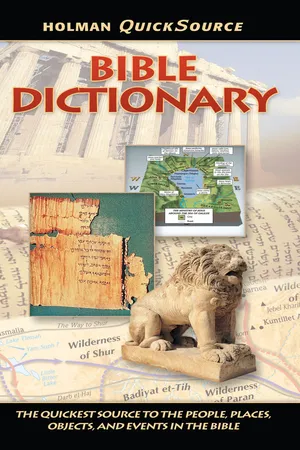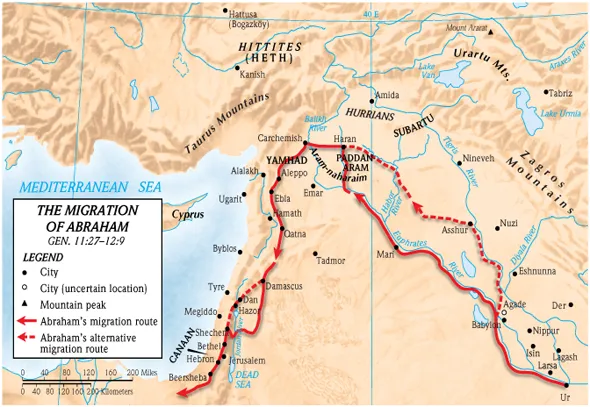
- 400 pages
- English
- ePUB (mobile friendly)
- Available on iOS & Android
eBook - ePub
About this book
Most Bible teachers say a Bible dictionary is the first reference tool a fledgling student of the Bible should acquire. The Holman QuickSource Bible Dictionary is a perfect tool for those who are beginning to study the Bible. It's definitions are both carefully researched and accessible. Definitions are designed to give the user a quick understanding of a term right up front and then, in many cases, go into more detail for those who want this level of description. Clear, concise definitions are enhanced by the large number of colorful maps, photos, and reconstructions of biblical objects. The size of the dictionary strikes the right balance making it both easy-to-carry and easy-to-see and use. The lay flat binding keeps the dictionary open at the page being consulted during personal study or group activities.
Tools to learn more effectively

Saving Books

Keyword Search

Annotating Text

Listen to it instead
Information

The Abana River (modern Barad River) flows through the country of Syria.
AARON Moses' brother; Israel's first high priest. His parents Amram and Jochebed were from the tribe of Levi, Israel's tribe of priests (Exod. 6:16-26). Miriam was his sister.
AARON'S ROD Aaron used a rod to demonstrate to the pharaoh that the God of the Hebrews was Lord. It became a snake when cast down (Exod. 7:8-13) and brought about the first three plagues (Exod. 7:19-20; 8:5-7,16-19). This rod was the same one used to strike the rocks at Horeb and Kadesh to bring forth water (Exod. 17:1-7; Num. 20:7-11).
ABANA or ABANAH (NASB) River in Syria. In his anger Naaman wanted to wash here rather than in the dirty Jordan (2 Kings 5:12).
ABBA Aramaic word for “father” used by Jesus to speak of His own intimate relationship with God, a relationship that others can enter through faith.
ABEDNEGO In Dan. 1:7 the Babylonian name given to Azariah, one of the three Hebrew youths who were conscripted along with Daniel to serve in the king's court. God delivered them from the fiery furnace (Dan. 2:48–3:30).
ABEL Though best known as the name of the second son of Adam and Eve, the word abel also occurs frequently meaning “vanity, breath, or vapor.” See Ecclesiastes, Book of.
Perhaps as a personal name, Abel alludes to the shortness of life. Such was the case with Abel (Gen. 4:8). Having offered “by faith…a better sacrifice than Cain” (Heb. 11:4 HCSB), he was murdered by Cain. Why Abel's sacrifice as a keeper of flocks was better than Cain's, whose sacrifice came from harvested fruits, is not directly stated in Gen. 4:4.
ABIATHAR Personal name meaning “father of abundance.” The son of Ahimelech and the eleventh high priest in succession from Aaron through the line of Eli. He survived the slaughter of the priests at Nob and fled to David, hiding in the cave of Adullam from King Saul (1 Sam. 22). Having escaped with the ephod, Abiathar became the high priest and chief counselor for David (1 Sam. 23:6-12; 30:7).
ABIB Month of the exodus deliverance from Egypt (Exod. 13:4) and thus of the Passover festival (Exod. 23:15; 34:18; Deut. 16:1).
ABIGAIL Personal name meaning “my father rejoiced.” 1. Wife of David after being wife of Nabal. She was praised for wisdom in contrast to Nabal, her arrogant and overbearing husband, who was a large landowner and successful shepherd. 2. Sister of David and the mother of Amasa (1 Chron. 2:16-17), married to Jether, an Ishmaelite (also called Ithra). Amasa, her son, was at one time the commander of David's army (2 Sam. 17:25).
ABIHU Personal name meaning “my father is he.” The second son of Aaron; one of Israel's first priests (Exod. 6:23; 28:1). He saw God along with Moses, Aaron, his brother, and 70 elders (Exod. 24:9-10). He and his brother Nadab offered “strange fire” before God (Lev. 10:1-22), resulting in judgment. God's fire consumed them.
ABILENE Small mountainous region ruled by the tetrarch Lysanias at the time that John the Baptist began his public ministry (Luke 3:2-3). Abilene was located about 18 miles northwest of Damascus in the Anti-Lebanon mountain range. Its capital was Abila.
ABIMELECH Personal name meaning “my father is king.” 1. King of Gerar, who took Sarah for himself, thinking she was Abraham's sister rather than his wife (Gen. 20). He restored her to Abraham after a nighttime dream of God. 2. Probably the same as 1., a king who disputed the ownership of a well at Beer-sheba with Abraham and then made a covenant of peace with him (Gen. 21:22-34). 3. King of Philistines at Gerar related to or identical with 1. Isaac lived under his protection and fearfully passed Rebekah, his wife, off as his sister. Abimelech scolded Isaac and warned his people not to touch Rebekah. A dispute over water wells led to Isaac's leaving but finally to a treaty of peace (Gen. 26) at Beer-sheba. 4. Son of Gideon, the judge of Israel (Judg. 8:31). 5. Priest under David with Zadok (1 Chron. 18:16), but correct reading of text here is probably Ahimelech as in 2 Sam. 8:17. 6. Person mentioned in title of Ps. 34, which apparently refers to 1 Sam. 21:10-15, where Achish is David's opponent. Abimelech may have been an official title for Philistine kings.
ABINADAB Personal name meaning “my father is generous.” 1. Resident of Kirjath-jearim whose house was the resting place of the ark of the covenant for 20 years after the Philistines returned it. His son Eleazar served as priest (1 Sam. 7:1-2). 2. Son of Jesse passed over when David was selected as king (1 Sam. 16:8; 17:13). 3. Son of King Saul killed by Philistines in battle of Mount Gilboa (1 Sam. 31:2). 4. Solomon's official and son-in-law over Dor, the Mediterranean seaport below Mount Carmel, was the Son of Abinadab or Ben-abinadab (1 Kings 4:11).
ABIRAM Personal name meaning “my father is exalted.” 1. Leader of rebellion against Moses and Aaron, seeking priestly authority. He died when God caused the earth to open and swallow the rebels (Num. 16; 26:9-11). 2. Son of Hiel sacrificed in foundation of rebuilt Jericho, fulfilling Joshua's warning (1 Kings 16:34).
ABISHAG Personal name meaning “my father strayed” or “is a wanderer.” A young virgin or “maiden” (RSV) brought to David's bed in his last days to keep him warm (1 Kings 1:1-4). They had no sexual relations, but Solomon considered her David's wife when his brother Adonijah asked to marry her after David's death (1 Kings 2:17).
ABISHAI Personal name meaning “father exists.” Son of David's sister Zeruiah and brother of Joab, David's general (1 Sam 26:6; 1 Chron. 2:15-16).
ABISHALOM Personal name meaning “my father is peace.” Another spelling for Absalom (1 Kings 15:2,10). See Absalom.
ABLUTIONS Ceremonial washings with water to make oneself pure before worship. The practice of ablutions is one background for NT baptism. The Hebrew term rachats is the everyday word for washing with water, rinsing, or bathing (Gen. 18:4; Exod. 2:5; Ruth 3:3). The Greek word louein is similar (Acts 9:37; 16:33; 2 Pet. 2:22).
ABNER Personal name meaning “father is a lamp.” The chief military officer for King Saul and Saul's uncle (1 Sam. 14:50). At Saul's death, he supported Ish-bosheth, Saul's son (2 Sam. 2:8) until Ish-bosheth accused him of treason for taking one of Saul's concubines (2 Sam. 3:7-8). Abner transferred loyalty to David. Joab, David's general, went into a jealous rage when David welcomed Abner. Joab then killed Abner, who was buried in Hebron (2 Sam. 3). See 1 Sam. 17:55-58; 20:25; 26:5, 14-15.
ABOMINATION, ABOMINATION OF DESOLATION That which is detestable to God and is particularly related to idolatry. “Abomination of desolation” is a special term in the book of Daniel and in these NT references: Matt. 24:15; Mark 13:14.
ABRAHAM Personal name meaning “father of a multitude.” The first Hebrew patriarch, he became known as the prime example of faith. He was the son of Terah, a descendant of Noah's son, Shem (Gen. 11:27). His childhood was spent in Ur of the Chaldees, a prominent Sumerian city. He was known at the beginning as “Abram” (“father is exalted”), but this was changed subsequently to “Abraham” (“father of a multitude,” Gen. 17:5).

Terah, his father, moved to Haran with the family (Gen. 11:31) and after some years died there. God called Abram to migrate to Canaan, assuring him that he would father a vast nation. At different times he lived in Shechem, Bethel, Hebron, and Beer-sheba. His wife Sarai's beauty attracted the pharaoh when they moved to Egypt during a famine (Gen. 12:10), but God intervened to save her. The trouble arose partly because Abram had claimed her as his sister rather than his wife, and in fact she was his half sister (Gen. 20:12). After returning to Palestine, Abram received further covenantal assurances from God (Gen. 15). He decided he could produce offspring by taking Sarai's handmaid Hagar as a concubine. Though the union produced a son, Ishmael, he was not destined to become Abram's promised heir. Even after another covenantal assurance (Gen. 17:1-21) in which the rite of circumcision was made a covenantal sign, Abram and Sarai still questioned God's promise of an heir.
Then Sarai, whose name had been changed to Sarah (“princess”), had her long-promised son, Isaac (“laughter”), when Abraham was 100 years old. Ishmael's presence caused trouble in the family, and he was expelled with his mother Hagar to the wilderness of Paran. Abraham's faith and obedience were tested by God in Moriah when he was commanded to sacrifice Isaac. God provided an alternative sacrifice, however, saving the boy's life. As a reward for Abraham's faithfulness, God renewed the covenant promises of great blessing and the growth of a mighty nation to father and son.
Subsequently, Sarah died and was buried in the cave of Machpelah (Gen. 23:19), after which Abraham sought a bride for Isaac. A woman named Rebekah was obtained from Abraham's relatives in Mesopotamia, and Isaac married her (Gen. 24:67). In old age Abraham remarried and had further children, finally dying after 175 years. Abraham recognized God as the almighty Lord of all and the author of a covenant by which the Hebrews would become a mighty nation. God Himself was known subsequently as the God of Abraham (Exod. 3:6). Through him God had revealed His plan for human salvation (Exod. 2:24). The promises to Abraham became assurance for future generations (Exod. 32:13; 33:1). Abraham became known as “God's friend forever” (2 Chron. 20:7).
John and Paul showed that descent from Abraham did not guarantee salvation (Matt. 3:9; Rom. 9). Indeed, foreigners would join Him in the kingdom (Matt. 8:11; cp. Luke 16:23-30). Lost sons of Abraham, Jesus invited to salvation (Luke 19:9). True children of Abraham do the works of Abraham (John 8:39).
For Paul, Abraham was the great example of faith (Rom. 4; Gal. 3). In Hebrews Abraham provided the model for tithing (Heb. 7) and played a prominent role in the rol...
Table of contents
- Cover
- Fulltitle
- Copyright
- Foreword
- Table of Contents
- A
- B
- C
- D
- E
- F
- G
- H
- I
- J
- K
- L
- M
- N
- O
- PQ
- R
- S
- T
- UV
- W
- XYZ
- Art Credits
Frequently asked questions
Yes, you can cancel anytime from the Subscription tab in your account settings on the Perlego website. Your subscription will stay active until the end of your current billing period. Learn how to cancel your subscription
No, books cannot be downloaded as external files, such as PDFs, for use outside of Perlego. However, you can download books within the Perlego app for offline reading on mobile or tablet. Learn how to download books offline
Perlego offers two plans: Essential and Complete
- Essential is ideal for learners and professionals who enjoy exploring a wide range of subjects. Access the Essential Library with 800,000+ trusted titles and best-sellers across business, personal growth, and the humanities. Includes unlimited reading time and Standard Read Aloud voice.
- Complete: Perfect for advanced learners and researchers needing full, unrestricted access. Unlock 1.4M+ books across hundreds of subjects, including academic and specialized titles. The Complete Plan also includes advanced features like Premium Read Aloud and Research Assistant.
We are an online textbook subscription service, where you can get access to an entire online library for less than the price of a single book per month. With over 1 million books across 990+ topics, we’ve got you covered! Learn about our mission
Look out for the read-aloud symbol on your next book to see if you can listen to it. The read-aloud tool reads text aloud for you, highlighting the text as it is being read. You can pause it, speed it up and slow it down. Learn more about Read Aloud
Yes! You can use the Perlego app on both iOS and Android devices to read anytime, anywhere — even offline. Perfect for commutes or when you’re on the go.
Please note we cannot support devices running on iOS 13 and Android 7 or earlier. Learn more about using the app
Please note we cannot support devices running on iOS 13 and Android 7 or earlier. Learn more about using the app
Yes, you can access Holman QuickSource Bible Dictionary by in PDF and/or ePUB format, as well as other popular books in Theology & Religion & Biblical Reference. We have over one million books available in our catalogue for you to explore.